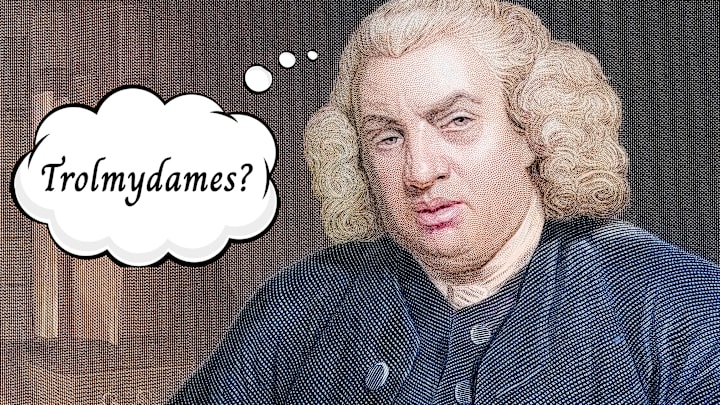It took roughly eight years for Samuel Johnson and his staff of six helpers to complete the Dictionary of the English Language, published on April 15, 1755. The work soon established itself as one of the most important dictionaries in the history of the English language and remained a landmark reference source right through the early 1900s.
Johnson—a celebrated humorist and anecdotist who also wrote countless works of journalism and criticism, biographies, essays, poems, and even a novel and a stage play—brought a huge amount of that wit and linguistic creativity to his dictionary, which defined over 42,000 words, using 114,000 literary quotations to illustrate them. Famously, for instance, he defined oats as “a grain, which in England is generally given to horses, but in Scotland supports the people”—but that definition is just the tip of the iceberg when it comes to the slights, barbs, and quips Johnson included in his dictionary.
- Backfriend
- Excise
- Finesse
- Gynocracy
- Lexicographer
- Lunch
- Nidorosity
- Patron
- Pension
- Politician
- Scelerate
- Sock, Bum, and Lizard
- Stoat
- Trolmydames
- Urinator
Backfriend

The Oxford English Dictionary calls a backfriend “a pretended or false friend,” but Johnson was more straightforward and defined the word as “a friend backwards”—or in other words, “an enemy in secret.”
Excise

No one likes paying taxes—and Johnson knew it. Excise was defined as “a hateful tax levied upon commodities and adjudged not by the common judges of property but wretches hired by those to whom excise is paid.”
Finesse

Johnson didn’t much care for French loanwords, and omitted a great deal of francophone words—including such familiar examples as champagne and bourgeois—from his dictionary. Many of those that he did include, meanwhile, had some serious shade thrown at them: Finesse is dismissed as “an unnecessary word that is creeping into the language”; monsieur was described as “a term of reproach for a Frenchman”; and ruse was labeled “a French word neither elegant nor necessary.”
Gynocracy

A gynocracy is a governing body of women, or women seen as a ruling class. In Johnson’s pithier words, however, a “gynecocrasay” was defined as a “petticoat government.”
Lexicographer

Johnson seemingly didn’t think much of his own job: On page 1195, he called a lexicographer “a harmless drudge” who “busies himself in tracing the original and detailing the signification of words.”
Lunch

Lunch wasn’t so much a time as a quantity in Johnson’s eyes: He defined it as “as much food as one’s hand can hold.”
Nidorosity

If you ever needed a word for an “eructation with the taste of undigested meat”—in other words, a really meaty burp—then here you are.
Patron

Johnson was commissioned to write his dictionary and paid a staggering 1500 guineas (around $430,000 in 2025) for his troubles. Even still, he couldn’t let the opportunity to have a dig at the London publishers who acted as his financial backers go by: He famously defined a patron as “a wretch who supports with insolence, and is paid with flattery.”
You May Also Like:
- 21 Words Created by Shakespeare (And 4 That Weren’t)
- 11 Words That Will Win You Any Game of Scrabble
- 80 Weird Words and Phrases
Add Mental Floss as a preferred news source!
Pension

A pension is “an allowance,” Johnson explained, adding that “in England it is generally understood to mean pay given to a state hireling for treason to his country.”
Politician

As well as “one versed in the arts of government,” Johnson defined a politician as “a man of artifice; one of deep contrivance.”
Scelerate

This 16th-century word for a villain or reprobate won’t be among the most familiar of entries in Johnson’s dictionary, but it does give us a prime example of both his disdain for French loanwords and for the authors who adopted them. On page 1758 he explains that the word was “introduced unnecessarily from the French by a Scottish author”—and then goes on to illustrate its use with a quotation from Scottish physician and scholar George Cheyne.
Sock, Bum, and Lizard

When you’re tasked with defining 40,000 words, it’s perhaps to be expected that some entries are going to be more half-hearted than others—and sock, which Johnson defined as “something put between the shoe and foot,” probably falls into that group. He also defined the word bum as “the part on which we sit,” and a lizard as “an animal resembling a serpent, with legs added to it.”
Stoat

Pity the poor stoat, which Johnson defined as “a small, stinking animal.”
Trolmydames

Johnson was nothing if not honest: All he had to say when it came to this word, which Shakespeare used in The Winter’s Tale, was “of this word I know not the meaning.” Noah Webster had a better idea when it came to compiling his American Dictionary 60 years later, however, and explained that the word is another name for “the game of nineholes,” a bowling game in which players have to roll balls into holes of different point values.
Urinator

Browse the dictionary and this one might raise a few eyebrows: Johnson defined a urinator as “a diver” or “one who searches underwater.” We might not agree today, but he wasn’t wrong: In this context, urinator derives from urinari, a Latin word meaning “to dive.”
